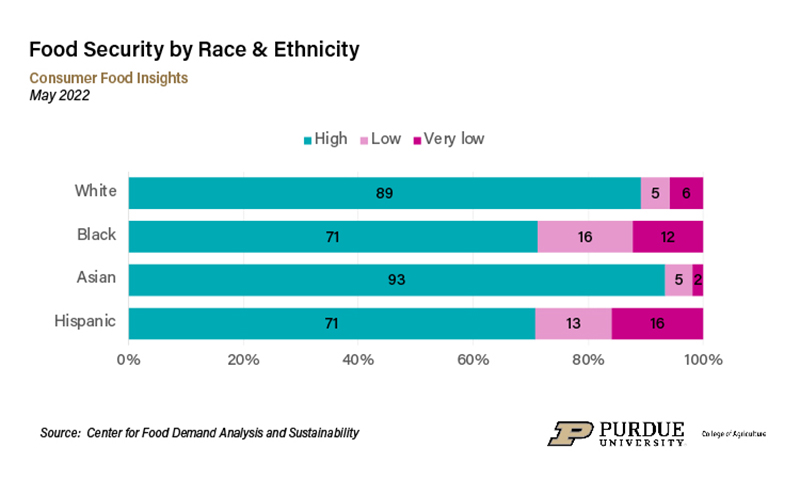Report shows differences in food insecurity, sustainable food purchasing between racial and ethnic groups
Black and Hispanic consumers are somewhat more likely to check food labels and much more likely to face food insecurity, according to the Consumer Food Insights Report.
The survey-based report out of Purdue University’s Center for Food Demand Analysis and Sustainability assesses food security and spending, consumer satisfaction and values, support of agricultural and food policies and trust in information sources. The latest report also details differences in food purchasing, preferences and food insecurity between racial and ethnic groups. The team analyzed the survey data from January through May to compare differences in responses across White, Black, Asian and Hispanic households.
“Significant disparities exist between racial and ethnic groups, and nearly 30 percent of Black and Hispanic households have experienced food insecurity this year,” said Jayson Lusk, the head and Distinguished Professor of Agricultural Economics at Purdue, who leads the center. “In addition, around 50 percent of Black and Hispanic households report waiting on their next paycheck or government payment to buy groceries. These data help us identify where to focus efforts to reduce food insecurity.”
Purdue experts conducted and evaluated the survey, which included 1,200 consumers across the U.S.
Additional results include:
-
Black and Hispanic food insecurity is more than double that of White and Asian households
-
16 percent of households are food insecure
-
Total food spending increased 7% from last month to $184 per week
-
55 percent of consumers think farmers should replace synthetic fertilizers with organic
-
A Sustainable Food Purchasing (SFP) Index of 68/100.
The Sustainable Food Purchasing Index offers insight into how sustainability and health relate to consumer behaviors. It is a self-reported assessment of how consumer shopping habits correspond with healthy diets from sustainable food systems.
 The Purdue Consumer Food Insights Report found Black and Hispanic food insecurity is more than double that of White and Asian households. (Purdue University image/Courtesy of the Center for Food Demand Analysis and Sustainability)
The Purdue Consumer Food Insights Report found Black and Hispanic food insecurity is more than double that of White and Asian households. (Purdue University image/Courtesy of the Center for Food Demand Analysis and Sustainability) The survey showed White adults were less likely than the other groups to purchase food that is typically promoted as more ethical or sustainable, for instance local foods, wild-caught fish, grass-fed beef, cage-free eggs and organic foods. The Consumer Food Insights Report, as well as other historic sources, also show Black and Hispanic adults are more likely to be vegetarian or vegan compared to the general population, said Sam Polzin, a food and agriculture survey scientist for the center and co-author of the report.
“Eating a plant-based diet is often presented as a cultural movement led by White yuppies, but we found that Black, as well as Asian and Hispanic consumers, are more likely to choose the plant-based and organic options,” Polzin said. “Eating fewer animal products may now be most associated with modern environmentalism, but it is important to remember that many non-Western food traditions - including Hinduism, Rastafari, and many indigenous tribes across the Americas - have long eaten little or no meat.”
Lusk notes that higher interest in plant-based diets may also be a result of income differences and the fact that meat tends to be a relatively expensive dining option.
Survey responses also showed Black Americans check food labeling, including GMO ingredients and place of origin, more often than other groups.
“As debates over sustainable food labeling are expected to heat up, we must understand which groups will be impacted by rapidly evolving policy discussions and accurately represent who new labeling standards are meant to benefit,” Polzin said. “Trust in the food system varies across racial and ethnic group as well, and food labeling can be a critical tool for communicating useful, expert-certified product information and building trust.”
The Trustworthiness Index measured by the survey reveals that Black and Hispanic adults trust government agencies such as the Department of Agriculture (USDA) and the Food and Drug Administration (FDA) significantly less than White does and Asian adults do.
The Center for Food Demand Analysis and Sustainability is part of Purdue’s Next Moves in agriculture and food systems, and it aims to use innovative data analysis shared through user-friendly platforms to improve the food system. In addition to the Consumer Food Insights Report, the center offers a portfolio of online dashboards.






